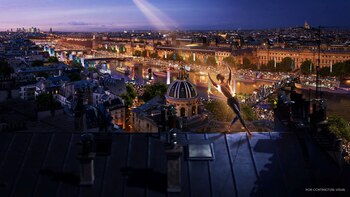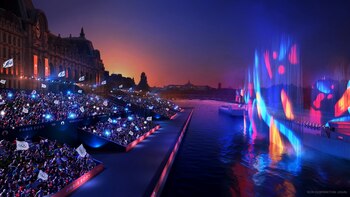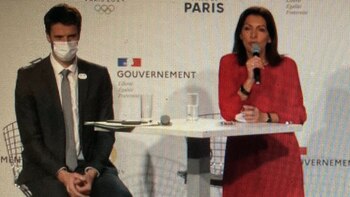
It promises to be an opening ceremony unlike any in the history of the Olympic Games – a visually stunning spectacle playing out and proceeding along a six-kilometer stretch of the Seine River as athletes are transported by some 170 boats to the Trocadero as the Eiffel Tower looms above.
Paris 2024 president Tony Estanguet vows the unprecedented ceremony will be memorable, creative and demonstrate how ambitious Paris 2024 organizers are, and what can be done for the Olympic and Paralympic movements. He said the concept is centered upon providing athletes with an unforgettable experience. The athlete delegations will depart by boat from Austerlitz Bridge to launch the evening.
“It is the Seine, the river, that will give the amazing experience to the athletes – they will be the first beneficiaries,” Estanguet said during a celebratory news conference in Paris on Monday evening. “We are going to be innovating again by opening the ceremony with the arrival of the athletes.
“We felt it was an important to capitalize as an existing décor, an existing backdrop that we could use and in many ways that will serve our history, our vision and carry the strong messages that we want to communicate as Paris 2024, and open it to as many people as possible.”
The athletes parade on the water will take them past some of the City of Lights’ iconic landmarks including the Notre Dame Cathedral, the Louvre, the Bourbon Palace, as well as under the numerous bridges representing the history of Paris.

Estanguet revealed the Paris 2024 organizing committee’s bold and innovative plans, while sitting alongside Paris mayor Anne Hidalgo during the energetic and upbeat news conference in the French capital.
It was also conveyed that French president Emmanuel Macron gave the green light for the unique and intricate opening to the XXIII Olympiad. Estanguet revealed the opening ceremony will occur on July 26, 2024.
Hidalgo elaborated upon the greater mission and message to be shared at the unprecedented opening to the Paris 2024 Games.
“This ceremony is an invention, a creation of Paris, and it is normal because after Pierre de Coubertin, who invented the first modern Olympics and who made these Games based on culture, humanism with a strong message, well, 100 years later we had to re-invent this message within the framework for these Olympics and Paralympic Games,” Hidalgo said.
“The Games will be an extraordinary show with the athletes at the heart of the exhibition in a superb context in the most beautiful city in the world,” she said.
The ceremony will be free and open to the public. Large bleachers will be constructed alongside both sides of the Seine River and it is estimated that some 600,000 spectators will be able to view some part of the proceedings, roughly ten times more than if it was held in a stadium. Some 90 giant video screens will be strategically placed all along the stretch of river to view the entire ceremony.

“The real innovation is that hundreds of thousands of people will be able to attend the opening ceremony for free for the first time the history of the Olympics Games, " said Estanguet, who paraded in four opening ceremonies as an athlete. “We’ve been able with this river to change the model.”
Light shows, orchestras, French circus art, suspended artists, rhythm changes and elaborate pageantry will be weaved into the evening festivities. Various sports such as BMX and diving will be showcased and athletic performers will participate along the river parade.
The ceremony will begin at 8:00 p.m. illuminated by the French capital’s summer evening light and move forward, mesmerizing those present as the light and mood continually change. The official part of the ceremony is set to take place at the Trocadero in close proximity to the Eiffel Tower.

Estanguet and Hidalgo did not reveal any details or information in regards to the proceeding of the Olympic torch and lighting of the flame, all of which they inform, are still to be determined.
Numerous French athletes viewed and were integrated into the Paris news conference via video feed from the French Alps ski resort of Tignes.
Martin Fourcade, France’s Olympic biathlon champion and head of the Paris 2024 Athletes Commission, noted the athletes’ involvement with the ceremony concept and ideas.
“The Athletes Commission and athletes were involved from the inception of this ceremony in line with the will of Paris 2024,” Fourcade said. “Having them be part of the ceremony right at the start is full of meaning and a good way to bring together all cultures.”
Finances, legacy & cleaning up the Seine

Estanguet was queried by French journalists about costs and security for the intricate ceremony held among the general public
“The fiscal component is at the heart of everything, just as it is for security,” Estanguet stated.
“Of course, the cost of the opening ceremony is going to be borne by the budget allocated to the organizing committee, which is funded by 98% contributions from private funds.
“Right now, we don’t have any clear fiscal figures to share with you.
“2022 is the year in which we will finalize the end costs of the four ceremonies,” the Paris 2024 leader said, also referring to the closing ceremony and Paralympics ceremonies.
Hidalgo said the ceremony will also highlight and bring further awareness to the mission of cleaning up the Seine River, while echoing the mission of the Paris Agreement, signed in April 2016.
“Of course, this will move everyone forward - part of the fleet is electric and we can look at other forms of water-based mobility,” Hidalgo said. “We are working with the regional prefect to clean the Seine River.
“One of the legacies that is going to be extremely visible is that river – the boats, the ceremony, the eco-design and eco-building are going to be vitally important.
“The quality of the water in the Seine has improved a lot, but still can improve further.”
Follow Brian on Twitter - @Brian_Pinelli
Últimas Noticias
Sinner-Alcaraz, the duel that came to succeed the three phenomenons
Beyond the final result, Roland Garros left the feeling that the Italian and the Spaniard will shape the great duel that came to help us through the duel for the end of the Federer-Nadal-Djokovic era.
Table tennis: Brazil’s Bruna Costa Alexandre will be Olympic and Paralympic in Paris 2024
She is the third in her sport and the seventh athlete to achieve it in the same edition; in Santiago 2023 she was the first athlete with disabilities to compete at the Pan American level and won a medal.

Rugby 7s: the best player of 2023 would only play the medal match in Paris
Argentinian Rodrigo Isgró received a five-game suspension for an indiscipline in the circuit’s decisive clash that would exclude him until the final or the bronze match; the Federation will seek to make the appeal successful.

Rhonex Kipruto, owner of the world record for the 10000 meters on the road, was suspended for six years
The Kenyan received the maximum sanction for irregularities in his biological passport and the Court considered that he was part of a system of “deliberate and sophisticated doping” to improve his performance. He will lose his record and the bronze medal at the Doha World Cup.

Katie Ledecky spoke about doping Chinese swimmers: “It’s difficult to go to Paris knowing that we’re going to compete with some of these athletes”
The American, a seven-time Olympic champion, referred to the case of the 23 positive controls before the Tokyo Games that were announced a few weeks ago and shook the swimming world. “I think our faith in some of the systems is at an all-time low,” he said.




